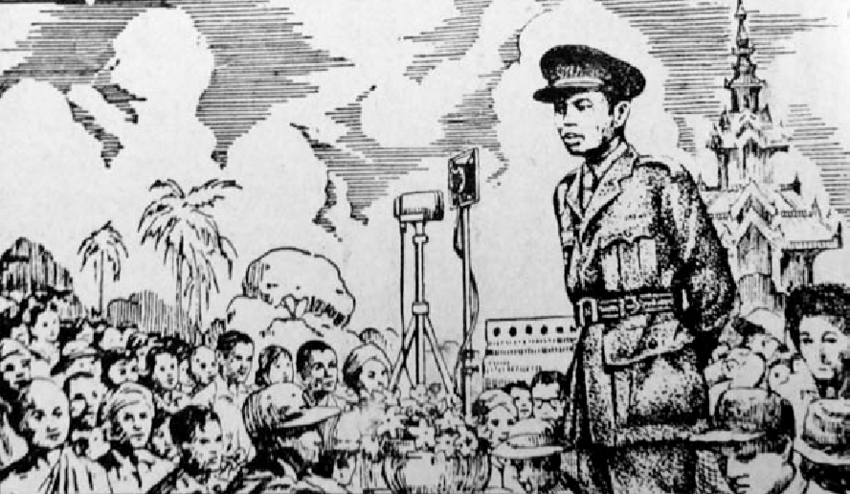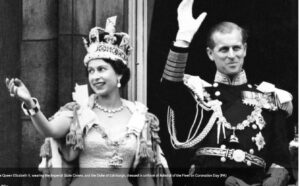A Legacy of Unity, Democracy, and Dignity for All
By Jeffrey Tin Htoon (R.I.T Yangon)
Edited & Adapted for MMNN
On July 19, 1947, General Aung San — Burma’s independence architect, founder of the national armed forces, and the unifying voice of its people — was assassinated alongside eight of his closest colleagues. He was just 32 years old.
Nearly eight decades later, his words still shine like a beacon, offering rare clarity in a nation often clouded by authoritarianism, division, and despair. His speeches, far from being mere historical relics, continue to guide and warn — relevant even now.
A Leader Who Walked the Talk
General Aung San wasn’t just a masterful orator. He was a doer, a strategist, and a man who proved his worth through action. Many say, “A thousand may be born in a generation, but only one becomes a true patriot.” Aung San was that one.
He led the nation through bold and unwavering steps toward independence — not by deceit or domination, but through principled strength. At every turning point, he addressed the people with what many have called “golden speeches” — heartfelt directives that remain as national treasures.
1. Unity as the Foundation for Prosperity
At the historic Panglong Conference on February 11, 1947, he called for genuine ethnic cooperation:
**“If we want the whole country to prosper, we must combine our manpower, financial resources, and materials — and strive with all our might.
If the Bamar do one thing, the Karens another, and the Shans and Kachins go their own ways — then there will be no benefit.
Only through collective effort can we succeed. We won’t know unless we try.”**
Again, on July 13, 1947, at Yangon City Hall, he gave a stern warning:
**“I don’t care for artificial shows of unity by opportunists.
Without true unity among ethnic groups and among the people themselves, even if we gain independence, the nation will remain fragmented.
It won’t matter which party rules or who governs — the country will remain broken.
So let us not allow these two forms of unity to collapse. They are absolutely vital.”**
His appeal was clear: Unity first — or independence will be hollow.
2. On Democracy, Law, and the Role of the Army
General Aung San had little patience for chaos or unlawful agitation. Yet he never used repression as a first resort. Addressing political disruption, he once stated:
**“The government never oppresses political opponents. But if there are unruly, lawless elements who disturb the peace and sabotage the country’s welfare, we cannot stand by idly.
If you disagree with how duties are carried out, say so openly and honestly. I am ready to step down.
But we cannot let wild accusations or noisy outbursts go unchecked.”**
At the AFPFL Central Committee in August 1945, he clearly defined the value of democratic governance:
**“We must make democracy flourish. It is the only system that aligns with both peace and independence.
We must strive to establish a free Burma under this doctrine.”**
On the role of the military, he was even more specific:
**“Our army must be the protector of the people, a refuge they trust.
If the military becomes something the people fear or despise, then it has failed its purpose.
If its leaders are weak, the army will be weak. If the army is weak, the country is weak. If the country is weak, our independence is meaningless.
Treat the people with respect and kindness. Let them look to us with confidence.
Our army must not oppress the people. It must serve the nation.
The nation must never become a servant to the army.”**
These were not anti-military statements. They were visionary words from the Father of the Army, reminding soldiers that loyalty to the people comes before power.
3. Politics is Personal — Not Just for Politicians
He broadened the definition of politics far beyond parliaments and cabinets:
**“People often think politics is only about government.
But politics begins with how you live your life — your home, your neighborhood, your village, town, district, and the entire nation.
Politics is in how people eat, drink, live, and work. That’s the real meaning.”**
He warned that the army should never become a privileged class, and should never dominate Parliament:
**“In my army, there must not be even a single man who seeks privilege.
If the people starve, we must all starve. If the people suffer, we must suffer with them.
Parliament must govern the army — not the other way around.
There must be no military dictatorship.”**
He also spoke firmly against racial supremacy:
**“Like other nations, Burma is home to many races.
In America, people of various backgrounds united to form one nation. We cannot cling to the illusion of one pure race.
Yes, love your own people. But do not hate or look down on others.
A correct understanding of race must promote harmony and mutual respect.”**
4. Faith is Personal — Religion is Not a Tool of Power
When U Ba Cho and others proposed declaring Buddhism as the state religion, Aung San rejected the idea decisively:
**“Since ancient times — from the days of King Alaungpaya — there have been Muslims in this land.
There are Christians. There are animist hill tribes.
They all stood with us during the struggle for independence.
To now use our majority religion to dominate others would be disgraceful.
If we do that, we’ll become creatures lower than dogs.
Think in terms of the nation. Don’t use religion for politics. We must organize the whole country together.”**
On February 27, 1947, he again warned against mixing monastic roles with political activism:
**“We do not approve of laymen becoming monks, or monks becoming laymen.
Those who preach politics as if it were religion are morally bankrupt.
They confuse the public so they can’t distinguish between truth and deception.
This is not true politics — it is selfish manipulation.”**
His clarity on secularism, pluralism, and freedom of belief remains astonishingly relevant today — as religion is again misused to divide Myanmar’s people.
5. A Final Pledge to the People
Aung San believed power belongs to the people, not politicians. He said:
**“We are in power because the people support us.
If we learn the public no longer trusts us, we will not cling to office.
Let them watch us for a year and decide: Are we the kind of leaders history will honor? Or the kind it will curse? You will see for yourselves.”**
He even made his future plans clear:
“Once we gain independence, I will retire from politics. I’ll grow a garden. I’ll write. I’ll live an honest life.”
But that future never came. On July 19, 1947, while leading a Cabinet meeting at the Secretariat, he and eight colleagues were assassinated by fellow Burmese — including U Saw, a Buddhist, former Prime Minister, and political rival.
Martyrs’ Day: An Eternal Flame
Martyrs’ Day, commemorated every July 19, marks not just a tragedy but a triumph. It honors those who gave their lives so Myanmar could be free. Their sacrifice remains sacred — an eternal flame in the nation’s heart.
As the country struggles through conflict, fragmentation, and distrust, General Aung San’s voice continues to call: for unity, for justice, and for dignity that belongs to all its people.
“As long as the Earth endures, July 19 shall be remembered. Not just as the day they fell — but as the day they showed us how to stand.”
Translated and adapted by MMNN editorial team
Source: Jeffrey Tin Htoon (R.I.T Yangon Technological University)






